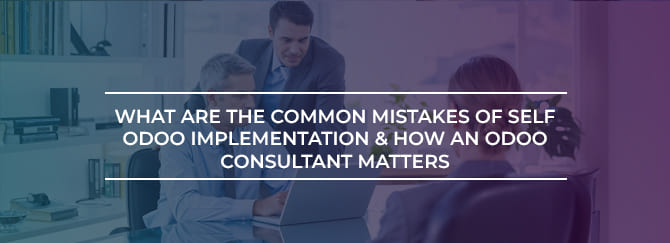
What are the Common Mistakes of Self Odoo Implementation & How an Odoo Consultant Matters
In today’s business environment, streamlining operations and maximizing productivity is non-negotiable. As a result, many companies turn to ERP systems like Odoo to unify their processes across departments from sales and inventory to HR and accounting. Odoo is commonly regarded as flexible, scalable, and has a diverse set of integrated modules. However, despite its user-friendly design, implementing Odoo successfully isn’t as straightforward as it seems.
Many companies, particularly small and medium-sized ones, prefer to install Odoo on their own. While the idea of a “do-it-yourself” ERP rollout may sound cost-effective at first, the reality often turns out to be quite different. DIY implementations frequently lead to unexpected roadblocks, extended timelines, budget overruns, and, in some cases, complete project failure. Here are some common mistakes of self Odoo implementation and how an expert Odoo consultant may make a huge impact.
Common Pitfalls of DIY Odoo Implementation
1. Lack of Technical Expertise: Odoo’s open-source nature gives users immense freedom to customize the system. However, this flexibility requires a solid understanding of technical concepts like server configuration, module development, and database management. Without in-house technical knowledge, it becomes difficult to adapt the system to meet specific business requirements.
2. Poor Requirement Analysis: One of the most common DIY mistakes is jumping into implementation without clearly defining business processes or goals. Skipping the analysis phase can lead to deploying irrelevant modules, inefficient workflows, or overlooking critical features altogether.
3. Underestimating Configuration Complexity: Setting up Odoo isn’t just about installing software—it involves complex configuration of user access rights, automation rules, data models, and workflows. DIY users often misconfigure these settings, leading to operational bottlenecks and system errors down the line.
4. Inadequate Data Migration: Migrating data from old systems into Odoo is a delicate task. Formatting issues, duplicate entries, or missing information can seriously affect system performance. Without the right tools and expertise, businesses risk corrupting data or losing essential information during the migration process.
5. Limited Integration Capabilities: Integrating Odoo with third-party applications like payment gateways, CRM systems, or eCommerce platforms is often crucial. DIY implementations typically lack the knowledge or tools to set up and maintain such integrations efficiently, leading to fragmented systems and inconsistent data.
6. No Testing or Change Management: Many DIY projects overlook the importance of thorough testing and user training. Without validating the setup in a controlled environment, minor errors can turn into major disruptions post-launch. Employees might feel difficulty utilizing the new system if they are not well prepared for the change.
How an Odoo Consultant Can Support You?
Hiring a certified Odoo consultant can significantly increase the chances of a successful implementation. Here's how they can help:
- In-Depth Needs Assessment: Consultants start by learning about your company's model, difficulties, and ambitions. This guarantees that the system aligns with your operational demands from the outset.
- Improved Settings and Customization: With expert knowledge of the Odoo platform, consultants can properly configure the system and develop custom features if required. They ensure that the ERP setup supports your specific workflows rather than forcing you to adapt to generic templates.
- Smooth Data Migration: Consultants use proven tools and best practices to ensure secure and accurate data migration. This means cleaner databases, fewer errors, and better historical reporting capabilities.
- Seamless Integrations: Whether you need to connect Odoo with an existing CRM, payment processor, or logistics system, a consultant has the know-how to integrate third-party applications effectively, providing a unified digital environment.
- Testing & User Training: Before going live, consultants conduct end-to-end testing to identify any functional gaps. They also teach your team to guarantee that employees are familiar with the new system and can utilize it effectively from the start.
- Post-Go-Live Support: Even after the system goes live, a consultant can offer ongoing support and optimization. They monitor performance, resolve bugs, and help adapt the system as your business evolves.
Conclusion
Odoo is a powerful tool for managing business operations, but proper implementation goes far beyond installing modules and adjusting settings. DIY approaches often lead to technical errors, data complications, and user pushback, which can outweigh any initial cost savings. Working with an experienced Odoo consultant ensures a smoother application configuration tailored to your specific requirements, helping you save time, reduce long-term costs, and maximize your return on investment. Partnering with the right expert can turn your ERP implementation into a great success.